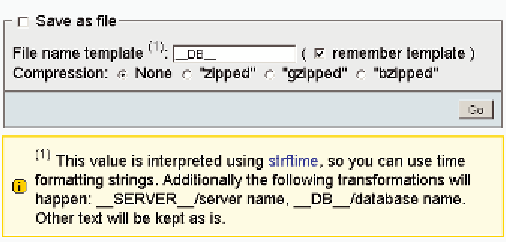Databases Reference
In-Depth Information
File Name Template
The name of the proposed file will obey the
File name template
. In this template, we
can use the special __
SERVER__, __DB__ and __TABLE__
placeholders, which will
be replaced by the current server, database or table name (for a single-table export).
Note that there are
two
underscore characters before and after the words. We can
also use any special character from the PHP
strftime
function; this is useful for
generating an export file based on the current date or hour. Finally we can put any
other string of characters (not part of the
strftime
special characters), which will be
used literally. The file extension is generated according to the type of export. In this
case, it will be
.sql
. Here are some examples for the template:
•
•
__DB__ would generate
dbbook.sql
__DB__-%Y%m%d gives
dbbook-20031206.sql
The
remember template
option, when activated, stores the entered template settings
into cookies (for database, table, or server exports) and brings them back the next
time we use the same kind of export.
The default templates are configurable, via the following parameters:
$cfg['Export']['file_template_table'] = '__TABLE__';
$cfg['Export']['file_template_database'] = '__DB__';
$cfg['Export']['file_template_server'] = '__SERVER__';
Compression
To save transmission time and get a smaller export file, phpMyAdmin can compress
to
zip
,
gzip
, or
bzip2
formats. phpMyAdmin has native support for the
zip
format,
but the
gzip
and
bzip2
formats work only if the PHP server has been compiled with
the
--with-zlib
or
--with-bz2
configuration option, respectively. The following
parameters control which compression choices are presented in the panel:




Search WWH ::

Custom Search